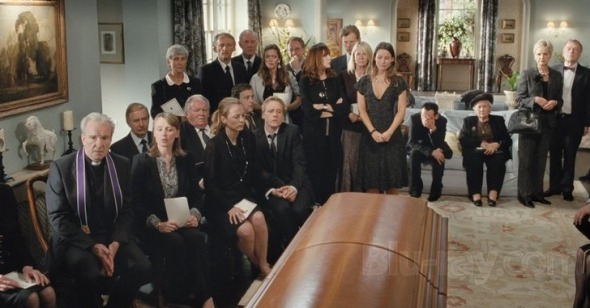By Brendon Bouzard
Death at a Funeral
Dir. Frank Oz, U.S./UK, MGM
Full disclosure: like many who hobby as a film critic, I have aspirations toward film production, and I’ve written more than my fair share of half-assed comedic screenplays. About five years ago I cranked out a response of sorts to the death of my grandmother, a darkly comic network-narrative farce about a dysfunctional family coming together to bicker at a funeral. One major plotline revolves around one of the attendees having accidentally ingested copious amounts of drugs prior to arriving, which by some embarrassing coincidence of parallel thought is also a major narrative strand in Frank Oz’s similarly conceived new film Death at a Funeral.
With that said, I would be mortified to discover that someone had ripped me off and made this film out of it. An ill-timed fart of alleged comedy featuring a cast of recognizable British and American character actors, Death is a haphazard marriage of old-fashioned farce and early-21st-century levels of cynical post-humor, with mannered performances and precisely choreographed comic beats.
The central figure around which a half dozen or so narrative strands will flail is Daniel (the likeably bland Matthew MacFadyen), son of the deceased and an aspiring novelist failing to live up to the fame of his elder brother (Rupert Graves). Trying to manage his father’s funeral, move out of the family home, plan a wedding, and write a eulogy, Daniel serves as a suitably “normal” entry point by which the film’s motley crew of weirdoes and deficients are compared. This crew includes Martha (Daisy Donovan), Daniel’s cousin, lost in her own subplot with a drugged-up fiancé, a stuffed-shirt father, and a feckless ex-lover (Ewan Bremner). Notably, the strongly unappealing Martha is the only real attempt at a female character in the film; all other women involved with the project serve as wallpaper or props of varying sorts. There are also some really hateful “laughs” along the way about an incontinent wheelchair-bound family patriarch (who, in the film’s naughty bid toward Farrelly Brothers-style yuks, shits all over another man’s hand—funny!) and his abusive relationship with Daniel’s hypochondriac friend Howard (Andy Nyman, the shining light here and in this year’s Severance).
This all proceeds along aimlessly at a gratingly boisterous pace, zipped around with some damned sub–Danny Elfman hijinks music, until, in its second half, the movie finds something to settle on for a while—to damning effect. That this plot, in which a mysterious American (Peter Dinklage) reveals a long-term affair with the deceased, plays out as an extended and rather virulent gay-panic joke, crashes the film to a halt. The American, you see, has pictures of himself with the father, and he wants hush-up money from the father’s sons to make up for being left out of the will. Soon enough, the deceased’s sons have brought together most of the film’s “normal” heterosexual men together to “deal with” the problem, sending the villainous, blackmailing faggot midget through a litany of slapstick punishments and saucy indignations. Cruelties build on cruelties until the film reaches a veritable fever pitch of humor-deficient misanthropy, at which point MacFadyen soothes our wounded spirits with some milky Hallmark humanism: “We’re just thrown here together in a world filled with chaos and confusion… with death always lingering around the corner… and we do our best.”
At its finest, this sort of farce has historically enunciated the social mores of a given time period, with the skeleton-in-the-closet evolving over time to match that era’s chief concerns. Death mines similar territory as La Cage aux folles and its bastard stepchild, The Birdcage, in its use of a parent’s sexuality as its chief narrative concern, but it lacks even the latter’s basic goodwill toward its characters. If we are to take the retrograde Death at a Funeral, with its open hostility or indifference toward women, gays, the disabled, and the elderly, to reflect the social mores of our era, it would simply be the most depressing thing I’ve seen in a theater all year. For the sake of my faith in humanity, I’m going to refuse to accept that, and consider this an aberration, a relic of a bygone, less enlightened era. Moviegoers of America: please prove me right.
